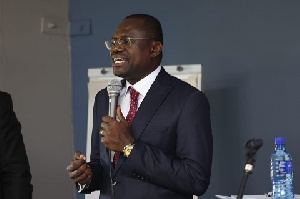Some of us are extremely dumbfounded to hear that former President Mahama has recently admonished President Akufo-Addo to reduce his ministers to a much more ‘reasonable number’ (reduce by about 40 Substantive Ministers and Deputy Ministers) so as to save the taxpayers money.
Whatever the case, it is quite bizarre for Ex-President Mahama to join the sceptics and keep grumbling over the quantum of President Akufo-Addo’s appointees and the accompanied expenditure.
Please, don’t get me wrong, I’m not seeking to upbraid the ordinary Ghanaians who are exercising their democratic rights to interrogate the rationale behind President Akufo-Addo’s decision to constitute a large size government.
However, if a known ‘Father Christmas’ or an unrepentant spendthrift bureaucrat joins in the public discourse and decides to raise concerns over alleged extraneous expenditure, then it raises an eyebrow, so to speak.
Make no mistake, the sceptics who are querying President Akufo-Addo’s appointment of 120 substantive and deputy ministers may have a legitimate concern.
However, if you were to ask my opinion on the issue under discussion, I will venture to stress that I do not harbour any marked disposition for or against the size of Akufo-Addo’s government.
Of course, meta-analysis shows that small teams are not necessarily much more effective and collaborative than large teams (Hoegl and Gemuenden 2001; Hoegl 2005).
On the other hand, we cannot conclude that small teams always perform exceedingly better than large teams.
Suffice it to state that the size of working teams would normally determine by the available resources and the enormity of the task at hand.
And more so if we were to base our analysis wholly on the ‘Ringelmann Effect’, then we could infer that large teams, like small teams, can perform efficiently through close supervision.
What is Ringelmann Effect?
The Ringelmann Effect is the tendency for individual team members to become less productive as the size of a team increases.
The concept was named after Maximilien Ringelmann, a French professor of agricultural engineering who passed away in 1931.
In one of his experiments, he asked volunteers to perform a very simple task, to pull on a rope.
He found that when one person is pulling on the rope, he gives 100% of their effort, however, as more people are added, the individual effort goes down (Forbes 2015).
The experiment was replicated in the 1970's by Alan Ingham who came up with the concept of "social loafing" which helps us understand why the individual effort decreases as the team size increases.
So why does this happen?
Somehow, it becomes harder to extract the individual contributions and performance of each person. So the individual rationale is "I don't really need to pull as hard because other people are contributing and nobody will really know how hard I'm pulling anyway.
Interestingly, the same concept explains why many people don't vote, why bystanders don't take action when needed, or why some people within teams slack off (Forbes 2015).
In fact, some of us do not want to brush aside the views of those who are suggesting somewhat passionately that we should rather reserve our criticisms until the tasks at hand have been completed and we can then measure the ‘input against the output’.
Of course, those who are fretting thy souls with extreme disappointments over the corresponding huge wage bill of the 120 appointees have my sympathy.
That said, I would like to know whether the critics would be content and take back their criticisms if President Akufo-Addo’s large size government managed to reverse the massive economic mess created by Ex-President Mahama’s supposedly small size, albeit incompetent government?
There is no denying or hiding the fact that Ghana has found itself in the throes of economic collapse due to the previous government’s economic mismanagement and the rampant bribery and corruption.
Indeed, there is an admissible evidence of gargantuan bribery and corruption cases, including monies that were given to individuals who did not render any services towards the national development.
What is more reckless than doling out large portions of Ghana’s scarce resources to party apologists like Madam Akua Donkor (2 Four Wheel Drive cars and a luxurious bungalow at a purported cost of $470,000) and Woyome (GH51.2 million), who did not contribute anything meaningfully to the nation building?
The rot in the erstwhile NDC government was so pervasive that even the diehard supporters threatened to boycott the 2016 general elections.
Mind you, large portions of Ghana’s resources went down the drain due to unpardonable mismanagement and the wanton corruption perpetrated by the officials of the erstwhile administration.
The erstwhile NDC government even managed to allocate judgement debt amount in the national budget (around GH600 million).
We cannot also leave out the scandalous corruption cases involving the Brazil World Cup, the infamous Bus Branding, SSNIT, NCA, the furtive Ford Expedition Vehicle, GYEEDA, AZONTABA, SADA, SUBAH, the purported $300million debt incurred on the faded STS housing deal, the dubious Embraer 190 Aircrafts and hanger for the Ghana Armed Forces and over a US$100 million oil revenue loss between 2011 and 2013 as reported by the Public Interest& Accountability Committee.
The Progressive Nationalist Forum (PNF) nonetheless estimates that monies lost to corrupt and dubious transactions under the presidency of John Dramani Mahama amounted to GHC5billion.
However, the total of my calculations in respect of all the recorded corrupt and dubious transactions exceeds that of the PNF, but I shall use the PNF’s figure of GH5billion in my analysis.
This is no attempt to justify the appointment of 120 ministers, far from it.
But let us please be honest, if a few individuals could conspire and embezzle over GH5 billion over eight years, then the substantive ministers and deputy ministers estimated four years wage bill of GH100 million is a ‘peanut’ in my humble opinion.
Substantive and Deputy Ministers salaries per the previous administration’s recommendation
A Cabinet Minister who is a Member of Parliament (MP) receives GH¢16,423, while a Cabinet Minister, who is not an MP, collects GH¢16,195.
A Minister of state who is an MP receives GH¢15,967, while a Minister of state who is not an MP goes home with GH¢15,739.
Regional Ministers who are MPs take home GH¢15,967, while those who are not MPs take GH¢15,511.
Deputy Ministers who are MPs collect GH¢14,876, while those who are not MPs receive GH¢14,369.
Deputy Regional Ministers who are MPs take home GH¢14,369, while those who are not MPs take GH¢14,142 (Source: Daily guide, 2016).
Based on the preceding figures, the average salary per minister is a little over GH15, 300. If you multiply the average salary by 120 ministers by 12 months will give us a total sum of a little above GH22.32 million (representing total annual salary).
For argument sake, let us increase the total annual salary figure to GH25 million over the four years and that should give us GH100 million (four years’ salary figure).
In sum, although the critics may have a genuine concern over the 120 ministers, I, for one, would have preferred that the hardworking men and women receive deserving remunerations than a few conspiratorial plotters squandering our resources through ‘create loot and share’.
K. Badu, UK.
k.badu2011@gmail.com
Opinions of Thursday, 22 August 2019
Columnist: Kwaku Badu















